Related Research Articles

Edgar Allan Poe was an American writer, poet, editor, and literary critic who is best known for his poetry and short stories, particularly his tales of mystery and the macabre. He is widely regarded as a central figure of Romanticism in the United States, and of American literature. He was one of the country's earliest practitioners of the short story, and is considered the inventor of the detective fiction genre, as well as a significant contributor to the emerging genre of science fiction. He is the first well-known American writer to earn a living through writing alone, resulting in a financially difficult life and career.

"Annabel Lee" is the last complete poem composed by American author Edgar Allan Poe. Like many of Poe's poems, it explores the theme of the death of a beautiful woman. The narrator, who fell in love with Annabel Lee when they were young, has a love for her so strong that even angels are envious. He retains his love for her after her death. There has been debate over who, if anyone, was the inspiration for "Annabel Lee". Though many women have been suggested, Poe's wife Virginia Eliza Clemm Poe is one of the more credible candidates. Written in 1849, it was not published until shortly after Poe's death that same year.

Rufus Wilmot Griswold was an American anthologist, editor, poet, and critic. Born in Vermont, Griswold left home when he was 15 years old. He worked as a journalist, editor, and critic in Philadelphia, New York City, and elsewhere. He built a strong literary reputation, in part due to his 1842 collection The Poets and Poetry of America. This anthology, the most comprehensive of its time, included what he deemed the best examples of American poetry. He produced revised versions and similar anthologies for the remainder of his life, although many of the poets he promoted have since faded into obscurity. Many writers hoped to have their work included in one of these editions, although they commented harshly on Griswold's abrasive character. Griswold was married three times: his first wife died young, his second marriage ended in a public and controversial divorce, and his third wife left him after the previous divorce was almost repealed.

Westminster Hall and Burying Ground is a graveyard and former church located at 519 West Fayette Street in Baltimore, Maryland, United States. It is currently part of the grounds of the University of Maryland's School of Law. It occupies the southeast corner of West Fayette and North Greene Street on the west side of downtown Baltimore. It sits across from the Baltimore VA hospital and is the burial site of Edgar Allan Poe (1809–1849). The complex was declared a national historic district in 1974.
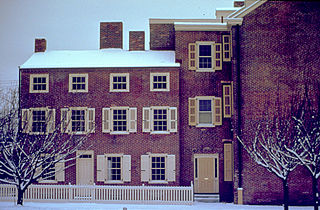
The Edgar Allan Poe National Historic Site is a preserved home once rented by American author Edgar Allan Poe, located at 532 N. 7th Street, in the Spring Garden neighborhood of Philadelphia, Pennsylvania. Though Poe lived in many houses over several years in Philadelphia, it is the only one which still survives. It was designated a National Historic Landmark in 1962.
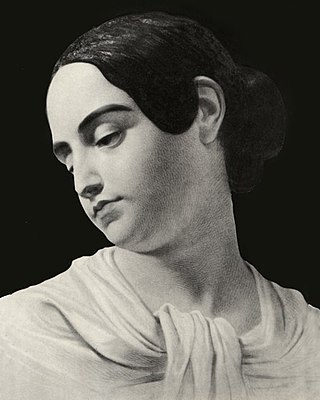
Virginia Eliza Poe was the wife of American writer Edgar Allan Poe. The couple were first cousins and publicly married when Virginia Clemm was 13 and Poe was 27. Biographers disagree as to the nature of the couple's relationship. Though their marriage was loving, some biographers suggest they viewed one another more like a brother and sister. In January 1842, she contracted tuberculosis, growing worse for five years until she died of the disease at the age of 24 in the family's cottage, at that time outside New York City.

Sarah Elmira Royster Shelton was an adolescent sweetheart of Edgar Allan Poe who became engaged to him shortly before his death in 1849.
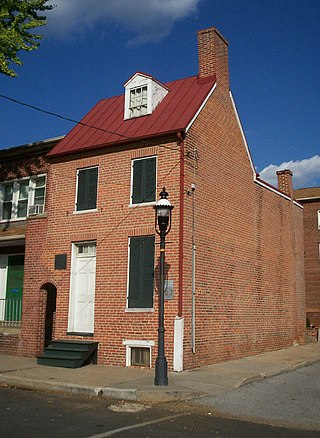
The Edgar Allan Poe House and Museum, located at 203 North Amity St. in Baltimore, Maryland, is the former home of American writer Edgar Allan Poe in the 1830s. The small unassuming structure, which was opened as a writer's house museum in 1949, is a typical row home. It was designated a National Historic Landmark in 1972.

The death of Edgar Allan Poe on October 7, 1849, has remained mysterious. The circumstances leading up to the final days of Edgar Allan Poe are uncertain, and the cause of death is disputed. On October 3, the American author was found delirious in Baltimore, Maryland, "in great distress, and ... in need of immediate assistance", according to the man who found him, Joseph W. Walker. He was taken to the Washington College Hospital, where he died at 5 a.m. on Sunday, October 7. He was 40 years old. Poe was never able to explain how he came to be in this condition.

Politian (1835) is the only play known to have been written by Edgar Allan Poe, composed in 1835, but never completed.
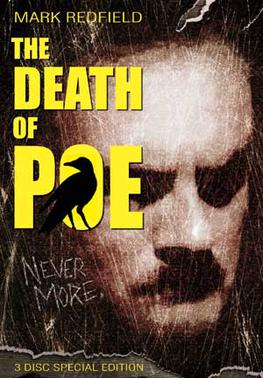
The Death of Poe is a 2006 independent film that tells the tragic story of the mysterious disappearance and death of the American author Edgar Allan Poe. The film is shot mostly in black-and-white with occasional color sequences.
Poe is a surname commonly found in the United States. The most famous bearer of the name was American writer Edgar Allan Poe (1809–1849), the grandson of an immigrant from County Cavan, Ireland. The name has also been used as an Anglicization of the German surname Pfau and of the Catalan surname Pou.

John Prentiss Poe Jr. was an American college football player and coach, soldier, Marine, and soldier of fortune, whose exploits on the gridiron and the battlefield contributed to the lore and traditions of the Princeton Tigers football program.
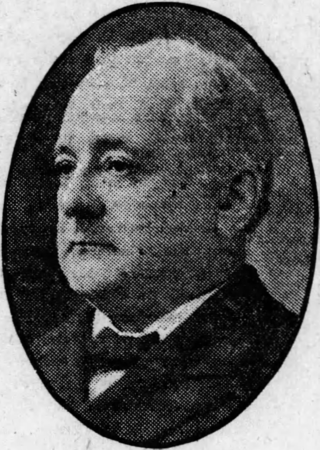
John Prentiss Poe was Attorney General of the State of Maryland from 1891 to 1895. He also served in the Maryland Senate from 1890 to 1891.
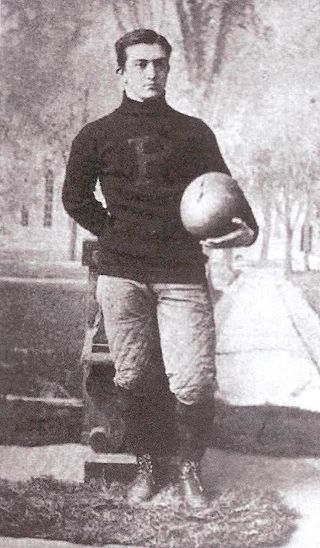
Edgar Allan Poe was Attorney General of the State of Maryland from 1911 to 1915. He was born in Baltimore, the son of former Maryland Attorney General John Prentiss Poe. He was named for his great uncle and second cousin, twice removed, the celebrated author Edgar Allan Poe, who died in 1849.
William Henry Leonard Poe, often referred to as Henry Poe, was an American sailor, amateur poet and the older brother of Edgar Allan Poe and Rosalie Poe.
Zaccheus Collins Lee was a Jurist, who served as U.S. Attorney for the District of Maryland.
Nevermore: The Imaginary Life and Mysterious Death of Edgar Allan Poe is a musical that was written, composed, and directed by Jonathan Christenson and designed by Bretta Gerecke. It follows the life of Edgar Allan Poe and the internal and external struggles he faced which are depicted as inspiring his writings. In the play, Poe struggles with tragedies such as death, abandonment, addiction, poverty, and loss. The script contains many references to Poe's poems and short stories. The script fictionalizes true events that took place in his life while also incorporating his creative works and poems. It was originally produced at the Catalyst Theater in Edmonton, Alberta, for an 11-week production that then went on to be performed at theater festivals, theaters across Canada, to the Barbican Theater in London, and the New Victory Theater in New York City.

The Poe brothers were six American football players who played football at Princeton University from 1882 until 1901. They were sons of John P. Poe Sr., an 1854 Princeton graduate and the Attorney General of Maryland from 1891 until 1895. They were also second cousins, twice removed, of the poet and short story writer Edgar Allan Poe, who died in 1849.

The Loves of Edgar Allan Poe is a 1942 American drama film directed by Harry Lachman, starring Linda Darnell and Shepperd Strudwick. The film is a cinematic biography of Edgar Allan Poe that examines his romantic relationships with Sarah Elmira Royster and Virginia Clemm.
References
- ↑ Sova, Dawn B. Edgar Allan Poe A to Z: The Essential Reference to His Life and Work. New York: Checkmark Books, 2001: 193. ISBN 978-0-8160-4161-9